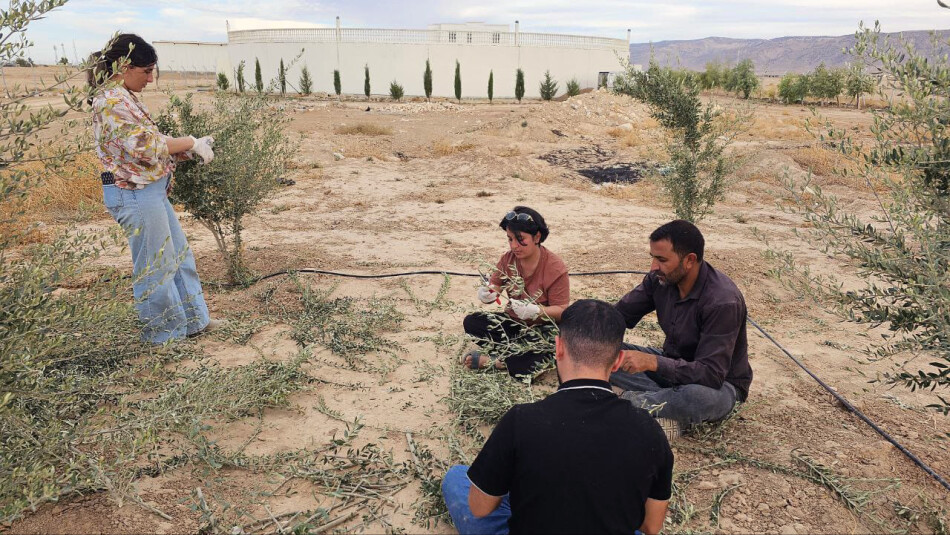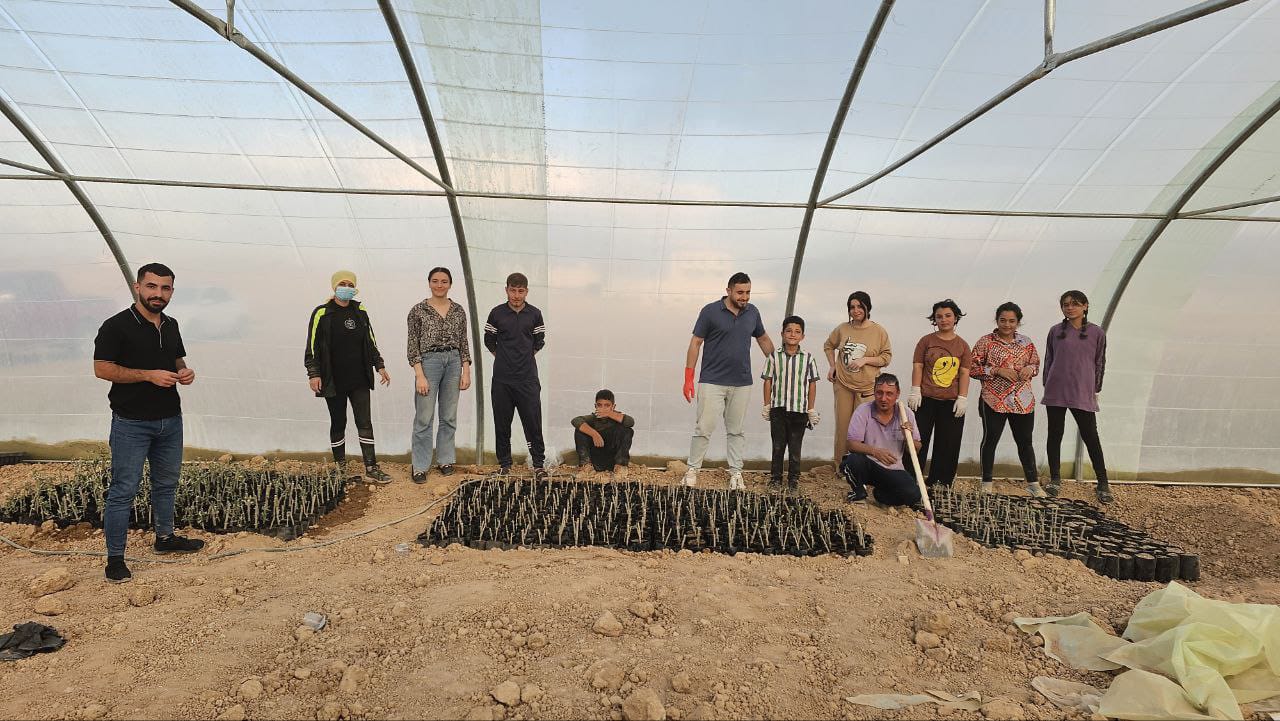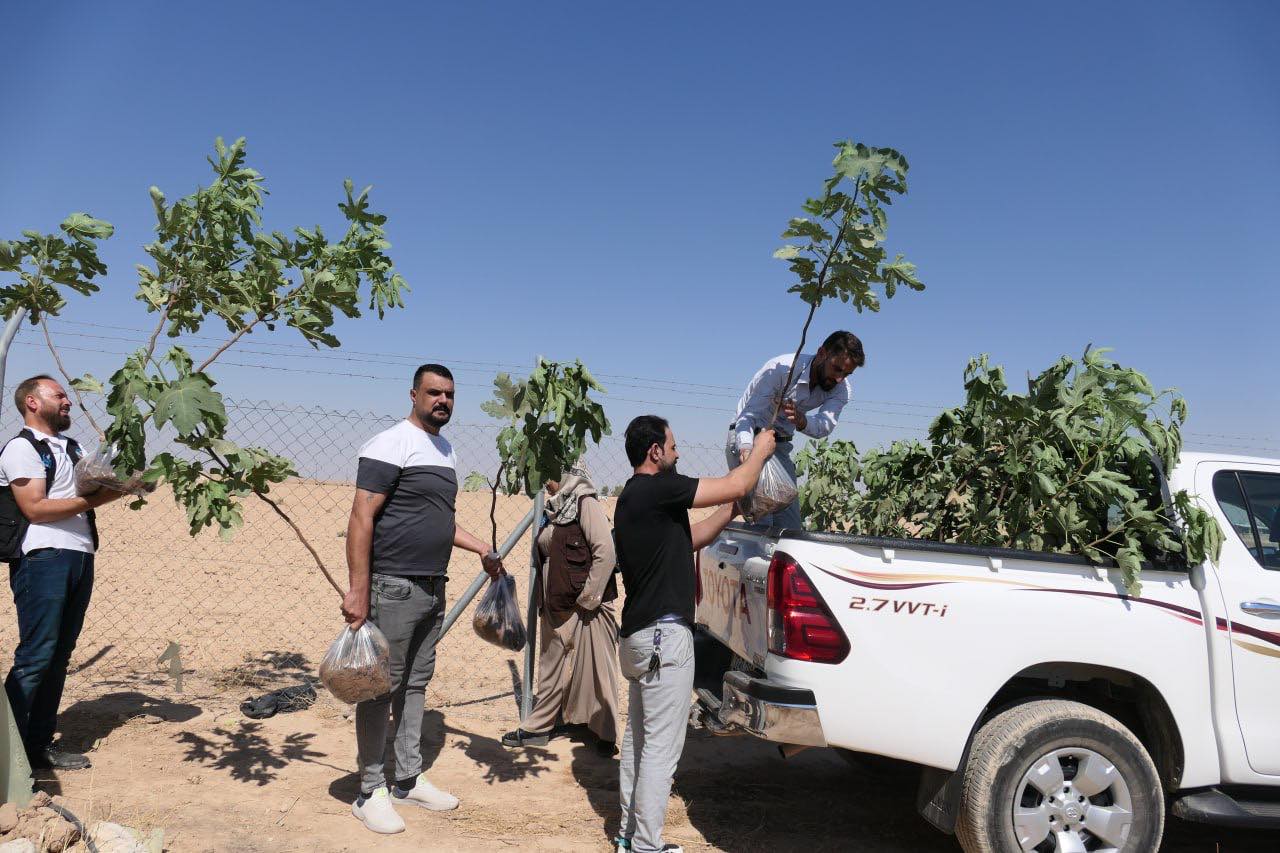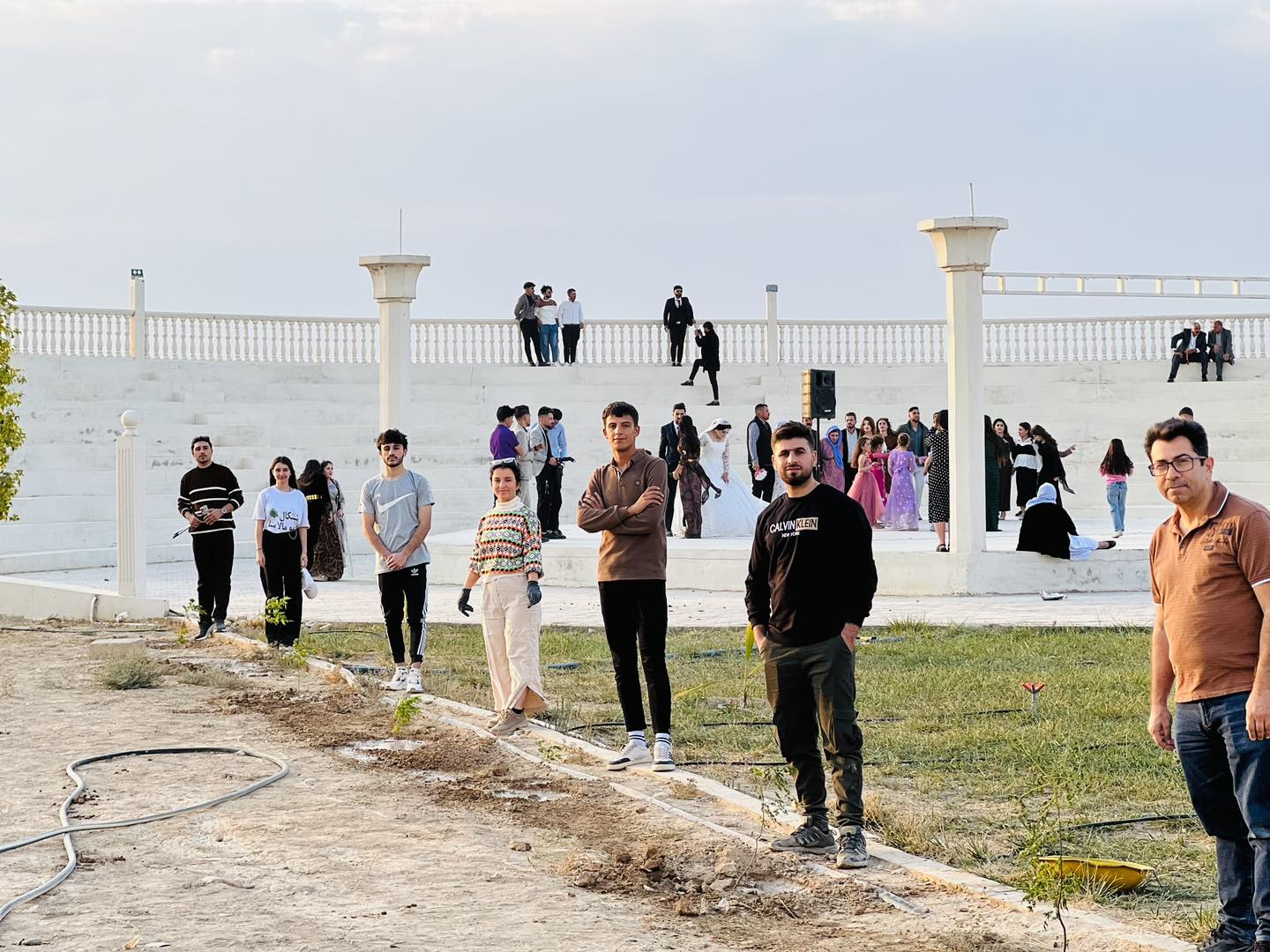
After returning to Shingal, Rana Balu climbed to the top of a mountain and contemplated the views of the city and how the gray color dominated it. It was like a barren, uninhabited land, so she decided to do her best to make Shingal green again.
"I said to myself, this mountain is my homeland and my home. Who would abandon their home and let it burn and disappear before their eyes? At that moment, I promised myself to join the initiative and volunteer to increase the percentage of green spaces and serve the community," according to Balu.
Displacement separated Balu, 25, from her homeland, and she returned after years of war to find it had turned into a mass of destruction. She decided to look for an opportunity to contribute to the return of life to Shingal.
The "Let's Make Shingal a Green Paradise" campaign was the opportunity she had been waiting for. Under her supervision and leadership, a major afforestation campaign was launched with the aim of planting one million trees in Shingal district within ten years.
I was one of the first to express my willingness to support the project that I was in dire need of
Ahead of the events of 2014 - the attack by the militants of the Islamic State in Iraq and the Levant (ISIL), 340,000 citizens from different religious and ethnic groups lived in Shingal, most of them Ezidis (Yazidis). Agriculture was one of the most important sources of livelihood for the population, but the war cast its shadow over this sector.
The launch of the initiative: Passion and determination
Girls constitute the majority of the volunteer team led by Rana, which includes 50 young men and women who devote their time to participating in the campaign, some of whom work from 9 am to 5 pm.
“Our goal is to plant one million trees to revive the agricultural sector in Shingal, which is famous for its fertile lands, as agriculture and greenery are part of our history and heritage,” Balu says.
The initiative was launched in October 2023 with the support of the House of Coexistence in Shingal and is scheduled to continue until October 2033. When Mirza Dinnayi spoke about the idea of the initiative, “I was one of the first to express my willingness to support the project that I was in dire need of.”
The House of Coexistence is financially supported by Mirza Dinnayi, winner of the Aurora Prize for Humanitarian Work, which was awarded to him in a ceremony held in 2019 in the Armenian capital, Yerevan, in appreciation of his work in the field of relief and aid for the displaced, especially the Ezidis.
“At first, the initiative was to plant 25,000 trees as a first step towards restoring the natural environment of the region and sustaining agriculture,” Dinnayi, said, adding that they are looking forward to continuing the project to comcuttingsate for the trees that were lost over the past years.
According to statistics and warnings from the United Nations, Iraq ranks fifth among the countries most affected by the repercussions of climate change, which include the risks of water scarcity, drought, high temperatures, pollution, and other natural disasters.
According to unofficial statistics from the Shingal Agriculture Division, about 4,000 fig trees dried up or their fruits withered during 2023 due to the repercussions of climate change and war.
Rana says that since 2003, at least one million trees in Shingal have been affected by the repercussions of climate change and died, in addition to the damage to the environment and agriculture of the region as a result of the events of 2014, which called for confronting this bitter reality by launching the initiative "Let's Make Shingal a Green Paradise."

"This initiative will play a role in confronting desertification that threatens the region. If we do not act quickly, desertification will affect not only the soil but all areas of life," Rana said, calling on residents to join forces to restore life to the land and achieve a better future for future generations.
According to official statistics from the Iraqi government, over 53% of Iraq's area is at risk of desertification, and thousands of people leave their areas every year due to desertification.
"A real threat faces 6,000 trees exposed to drought in the village of Tirif, north of Shingal Mountain. The same problem will affect other areas if we do not take urgent measures. In this context, the campaign to plant one million trees becomes urgent to restore Shingal's nature and confront the repercussions of climate change,” according to Rana.
Priority for fig and olive trees
The Million Tree Initiative focuses on planting fruit trees, specifically olive and fig, all over Shingal to revive the environment and the agricultural sector in the district.
"The seedlings are propagated with cuttings and cared for until they become saplings and then distributed to beneficiaries," Balu proudly said.
The project has published an electronic link through which farmers or affected gardeners can submit their requests to obtain saplings. This is repeated every period according to the planting season for the suitable tree. After that, according to the electronic application form and post evaluation, the number of saplings that will be distributed to each farmer for planting is determined.
In addition, the trees are planted by the campaign team, and young people and organizations are invited to participate in the campaign.
This type of initiative can lead to securing sources of income for a large number of farmers who are unable to plant trees in their orchards due to their poor financial situation.
"So far, 25,000 fig and olive trees have been planted in the nurseries of the Coexistence House in Sinuny," according to Rana.
The young volunteers are trained on how to plant and propagate by cuttings using scientific methods. The process goes through several stages, starting with taking cuttings from the mother tree, then preparing the soil mixed with organic fertilizer to plant the seedlings.
In the next stage, the volunteers are trained and prepared for the next agricultural season, in the presence of experts, as an agricultural engineer is currently supervising this stage.
Rana also explained that the aim of the training is to provide complete and correct training for volunteers on the latest agricultural techniques, including choosing the right time and location, identifying the right soil and typical irrigation methods.
The campaign recently began another voluntary step to prepare 8,000 fig, olive, and pomegranate seedlings within three weeks to be distributed to farmers for free next spring. Dinaei says that the campaign encourages the cultivation of olive and fig trees to become a source of livelihood for the residents of the area who spent years in displacement and are gradually starting to return.
"We distribute fig and olive trees to farmers for free, especially those affected by drought."
Shingal Mountain and the surrounding villages are famous for their fig and olive trees, and Shingal District, west of Nineveh Province, is known as one of the regions of Iraq that is distinguished by producing the finest types of figs, grapes, honey, tobacco, and dozens of other crops. Shingal olives are among the finest types, especially for producing olive oil.
Fig and olive trees are distinguished by their ability to confront the effects of climate change. Figs ripen from the end of June to the end of October at temperatures ranging from 29 to 38 Celsius degrees, while the olive harvest season lasts from October to the end of the year, and grows at temperatures ranging from 20 to 30 Celsius, but both trees can withstand temperatures exceeding 40.
Barakat Issa, the Director of the Sinuny Agriculture Division, described the campaign to plant one million trees in Shingal as “very positive” for reviving the agricultural sector and the environment of the region.
“This type of initiative can lead to securing sources of income for a large number of farmers who are unable to plant trees in their orchards due to their deteriorating financial situation.”
In 2021, the fig crop production in Sinuni district of Shingal amounted to only 75 tons out of 150,000 fig trees, while in 2019 hit 150 tons.
Issa pointed out that this noticeable difference reflects the significant decline in fig production, and he hopes that the initiative will lead to an increase in production.

Fig trees distributed to Shingal peopleas part of the initiative to plant them, Nineveh, 2024. House of Coexistence
Beneficiaries and Volunteers
The initiative to plant one million trees in Shingal benefited a wide segment of society and strengthened solidarity. Some of them volunteered to prepare the seedlings so that others could plant them in their season. Then the beneficiary group volunteered again for others to plant, and the process continued in this manner.
Fayza Omar (23 years old) in Sinuny volunteered to collect the cuttings for the House of Coexistence nursery.
“I also fill the bags with soil mixed with organic fertilizer so that they are ready to plant the cuttings and I participate in caring for the seedlings,” Omar Said.
“I have a great desire to plant and care for trees. I feel proud to be providing a service to my city,” she added.
These campaigns have become a source of inspiration for other initiatives. This year, a civil society organization launched a campaign to plant seedlings in four areas north of Shingal district to protect them from desertification and increase the percentage of green spaces.
Bayezid Khaled, 25, is a young volunteer from the Khanasour complex. As part of his tasks in the tree planting campaign, he collected cuttings of different types of figs.
“I brought between 1,000 and 1,500 cuttings of figs and olives,” he says.
Khaled says that he has loved agriculture since he was young because his father used to grow tobacco.
The scenes that Bayezid used to see as a child are no longer the same, as the gray color has become dominant.
“I always used to say, if only we could bring life back to our city... When I heard about the initiative, I joined it without hesitation. At first, our numbers were small, but support is increasing day by day.”
According to a United Nations report, before the ISIS war, agriculture was the main source of income for about 85% of Shingal’s population, but this sector has suffered significant damage.
Omar Khalaf, 45, one of the affected Sinuny farmers, benefited from the initiative when he heard about it from his friends.
"I went directly to provide assistance because I own land that can accommodate two thousand trees. This initiative was very useful to me and to the orchard owners."
Khalaf says that Shingal needs such initiatives.
"Plant and do not cut, trees are also useful for the mountains."
The Iraqi Ministry of Migration and Displacement also launched a volunteer campaign in Shingal last month in cooperation with the municipality to plant trees in the district, as part of an initiative by the General Secretariat of the Prime Minister's Office to plant one million trees with the aim of combating desertification in all provinces.
We need logistical support to provide the main requirements for the project.
The challenges are numerous
The repercussions of climate change are increasing and accelerating day after day, and this requires a well-thought-out plan by the government, as civil society organizations and initiatives cannot confront these repercussions alone.
"We need logistical support to provide the basic requirements for the project, in addition to organizing training courses for volunteers to ensure the continuity and success of the initiative," Balu says.
War-torn Shingal still suffers from the absence of a unified administration, as it has no local government, and the district is one of the disputed territories between the Iraqi federal government and the Kurdistan Regional Government KRG.

The volunteer team while planting trees: First from the right Mirza Dinayi, and fourth Rana Balu, Nineveh, 2024. House of Coexistence
About the challenges, Bayazid says, "One of the challenges is the lack or scarcity of transportation. If special vehicles were available for volunteers, things would go easier."
Destruction and the effects of war are other challenges facing the environment in Shingal. According to statistics from the Ministry of Environment, the district is still polluted with war remnants. Initially, the area of pollution reached more than 75 square kilometers, while the removal of war remnants continues.
Balu is still as passionate as she was at the beginning of the campaign.
“We believe that every tree we plant has its own story, and every story is a new opportunity for life. In this initiative, we not only bring life back to the land, but we also bring hope back to our people.”
“Planting these trees is to build the community and enhance the spirit of cooperation, we all look forward to and reap the fruits of what we have planted.”